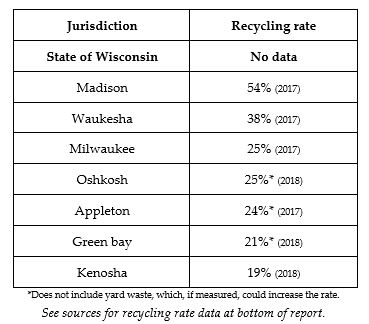The State of Recycling in Wisconsin
Recycling rates in major cities throughout Wisconsin reveal one of the more wasteful states in the nation. Based on the most recent available data, only Madison and Waukesha have managed to eclipse the national average of 34.7 percent (see table below). Due to a lack of reporting in certain jurisdictions, the state’s overall recycling rate is unclear. However, given low rates in major cities, evidence from other states suggests that Wisconsin’s statewide rate is even lower than the national average.
Downloads
Recycling rates in major cities throughout Wisconsin reveal one of the more wasteful states in the nation. Based on the most recent available data, only Madison and Waukesha have managed to eclipse the national average of 34.7 percent (see table below). Due to a lack of reporting in certain jurisdictions, the state’s overall recycling rate is unclear. However, given low rates in major cities, evidence from other states suggests that Wisconsin’s statewide rate is even lower than the national average. The table below shows how those cities stack up:

Gathering comprehensive recycling data is crucial to understanding problems, establishing goals, and making improvements. To this point, Wisconsin has not established any statewide goals for waste reduction, recycling, or compost.
Wisconsin has an opportunity address its excessive trash output and catch up with the rest of the nation in waste reduction. Recent changes in international waste trade have opened a new window of opportunity for recycling and economic development. For decades, cities throughout the United States sent millions of tons of scrap material to China to be recycled. This past year, China effectively stopped accepting our refuse, claiming it was too contaminated and unsellable for recycling. With nowhere to go, recyclables have been piling up in sorting facilities throughout Wisconsin and many other states. This disruption has increased service costs, decreased revenue, and in some cases led recycling collectors to stop their services.
As the saying goes, change brings opportunity. Recycling already brings economic benefits in the form of roughly $1 billion in wages and $5.7 billion in sales annually. In the wake of China’s policy changes, Wisconsin has an opportunity to further develop its recycling economy through expanded collection, sorting, and end-market solutions previously provided by China.
